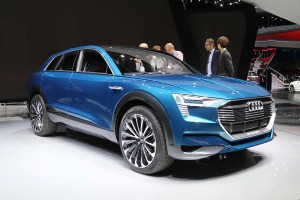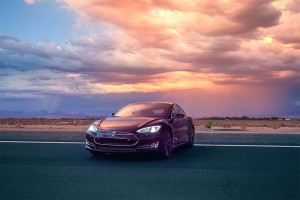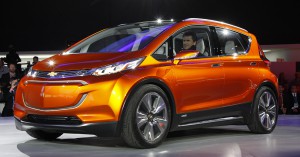Automakers normally go to great pains to promote their latest models. But when the new Fiat 500e was launched a couple years ago, Fiat Chrysler CEO Sergio Marchionne asked potential buyers to steer clear, admitting, “We will lose $10,000 per vehicle.”
The primary reason? The high cost of the batteries used to power the 500e, lithium-ion technology running as much as $1,000 per kilowatt-hour at the beginning of the decade. For most of the battery-cars now on the market their onboard power packs account for the overwhelming share of the vehicle’s price tag – sometimes even more than what customers have actually been paying.
But battery prices finally appear to be heading down. While industry officials are generally reluctant to discuss such a competitive detail, observers believe many manufacturers are now paying about $400 per kWh, and during a conversation at the Frankfurt Motor Show this week, Audi’s R&D chief Ulrich Hackenberg told TheDetroitBureau.com that the maker expects that to dip to $200, perhaps closer to $100 by decade’s end.
“That would be incredible,” responded Dave Sullivan, senior analyst with consulting firm AutoPacific, Inc. “If the costs (for batteries reach the point they) are parallel to a gasoline car up front, that changes everything.”
(Rapid changes mean you might not even recognize your car a decade from now. Click Here for more.)
Perhaps no manufacturer is more looking forward to seeing the floor under battery prices open up than Tesla Motors. Consider the new Model S P90d model the maker is adding to its mix, the first version of the battery sedan expected to get over 300 miles range per charge.
At the price of batteries when the Model S was first conceived, the P90d’s 90 kWh battery pack would have cost the maker $90,000. Today, analysts estimate it’s down to around $36,000 – still a hefty premium over a gasoline powertrain. But if Tesla even gets its cost down by another 50%, it would trim the pack’s cost by $18,000.
To get there, Tesla is taking things into its own hands. It is in the midst of erecting the massive Gigafactory in Reno, Nevada to produce batteries for its future vehicles – as well as a new line of backup battery systems for home and office. Expected to be the world’s largest source for lithium-ion technology, it should drive costs down significantly, Tesla CEO Elon Musk has forecast.
There’s plenty of debate over how fast battery costs have and will continue to fall. Part of the problem is that sales of vehicles using Lion batteries have been in a slump lately, the result of low petroleum prices. Nonetheless, a recent study posted in Nature Climate Change was optimistic.
Authors Bjorn Nykvist and Mans Nilsson wrote that, “industry-wide cost estimates declined by approximately 14% annually between 2007 and 2014, from above US$1,000 per kWh to around US$410 per kWh.” And some manufacturers are already getting batteries for $300 a kWh.
That will become all the more critical as the number of automakers offering longer-range battery-cars expands. At the Frankfurt Motor Show, for example, Audi unveiled the e-tron Quattro SUV Concept, which is expected to get 500 kilometers, or about 310 miles, per charge when it comes to production in 2018. Porsche showed off a high-performance supercar with similar range that it may build.
General Motors is planning to bring the 200-mile Chevrolet Bolt to market in barely a year, while Tesla is about two years out from the launch of the more mainstream Model III. The latter is expected to cost around $35,000 after federal tax incentives are factored in. To get there profitably, Tesla will need cheap batteries.
(VW, Audi plan to “electrify” every vehicle they build. Click Here for the full story.)
Plunging prices could solve two critical obstacles to the success of battery-based vehicles. For one thing, noted analyst Sullivan, if batteries do get down to around $100 a kWh, electrified vehicles would become competitive in cost to comparable gas-powered models – even before factoring in savings on energy.
Meanwhile, offering “longer range will help,” said Carlos Ghosn, CEO of Nissan Motor Co., by eliminating so-called “range anxiety.”
But Ghosn, whose Leaf is the world’s best-selling battery-electric vehicle, stresses that cheaper batteries alone won’t ensure success. The missing piece of the puzzle is a nationwide network of chargers – preferably high-speed “Level III” chargers – that would make the switch from gas to battery all but transparent.
Tesla is setting up its own supercharger network to help get the process charged up, and California is one of several states investing heavily in public charging stations. As battery-based vehicles become more widely available in automotive showrooms, that could make it possible to actually put more of them on the road.
(Click Here for the complete 2015 Frankfurt Motor Show round-up.)




As usual tax payers are getting fleeced by corrupt politicians. Eventually people will get tired of being raped and leave CA. Paying for EV charging stations should be the responsibility of the EV makers and their partners, not the government.
Elon Musk’s businesses only exist because he is getting government grants and subsidies which are all paid for by tax payers. Tax payers are paying for the Giga factory too. PT Barnum would be amazed that one person could con the populace out of so much money. Of course if the populace knew how much money crooked politicians are providing to Musk, heads would roll.
GT101
EV charging stations ARE being paid for by the EV maker (there is only one).
The remaining EV charging stations are being paid for by EV charging companies. None by the taxpayer.
The concern you have is valid, but it should be directed at HYDROGEN filling stations being paid for by the taxpayer for the benefit of giant foreign companies like Toyota, Honda and Hyundai.
You’re right, let’s just continue to shovel subsidies at the fossil fuel industry instead and not bother changing a thing. Innovation, changing our world for the better – who cares?
It is completely absurd for grown adults to be talking about $400 per KWh for batteries.
Sure that is possible for a little EV project operated by the PR department and sure it’s possible for little batteries used in hybrids.
Tesla is well under $200 per KWh already, most likely $160 per KWh and about to drive it down closer to $125 within 12-18 months.
One more thing. Tesla’s cost per horsepower is already much cheaper than internal combustion. How many 750HP engines do you see packaged in a vehicle you can buy today for $115K?
There are numerous places where tax payers are paying for the charging stations and this is wrong. Every auto consumer is subsidizing the cost of EVs and this too is wrong. States that do not charge EV drivers road taxes are wrong.
As I have stated before those selling the vehicles be they EVs or hydrogen fuel cell cars need to work with free enterprise to build the recharging/refueling stations. Tax payers should not be paying for these. I get absolutely NOTHING from paying for someone else’s pipedreams and I should not have to pay for someone else’s pipedream unless they want to pay for my pipedreams. EV/Hydrogen consumers should NOT be receiving tax breaks and other financial incentives. If these vehicles have commercial value then those who want them will pay for them. Forcing tax payers to subsidize this folly is absolutely wrong.
You seem to pick isolated criteria to promote EVs. How far can an EV travel on one full charge vs. a clean Diesel on one full tank of fuel? How many EV recharging stations are there on the roadways of the U.S. vs. Diesel filling stations? How many people are going to drive 50-100+ miles out of their way when traveling to be able to recharge their EV battery and how long will it take? What is the drive range on an EV in the Winter when temps are below 32F? What is the EV range when the interior heater and windshield wipers are in use? What is the EV range when driving in snow with the heater and defrosters operating? Those are fair questions that EV cultists don’t like to deal with.
Are there any truly clean diesel engines? I think not if current news is correct. You go ahead with your fossil fuel guzzling and leave a world that your children and their children will find quite difficult to breath in assuming their coastal homes are not under salt water. I wager your great grandfather railed against the horseless carriage as well. I’d better he was truly upset at the government building highways for the new fangled technology at his expense(taxes).
How is it then that you are willing to subsidize roads, air traffic control, and other features of our transportation infrastructure? Toll roads (free enterprise) are great things, but do you want toll roads everywhere? How far could you travel if you depended solely on a toll road?
Toll roads would cost drivers a $1000 per year, then you would see the results of a for profit “free” market.